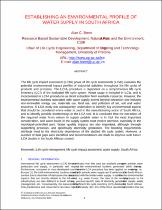JavaScript is disabled for your browser. Some features of this site may not work without it.
- ResearchSpace
- →
- Research Publications/Outputs
- →
- Conference Publications
- →
- View Item
| dc.contributor.author |
Brent, AC

|
|
| dc.date.accessioned | 2007-07-03T10:24:21Z | |
| dc.date.available | 2007-07-03T10:24:21Z | |
| dc.date.issued | 2006-11 | |
| dc.identifier.citation | Brent, AC. 2006.Establishing an environmental profile of water supply in South Africa. 5th Australian Conference on Life Cycle Assessment: Achieving business benefits from managing life cycle impacts, Melbourne, Australia, 22-24 November 2006, pp 1-13 | en |
| dc.identifier.uri | http://hdl.handle.net/10204/881 | |
| dc.description.abstract | The life cycle impact assessment (LCIA) phase of life cycle assessments (LCAs) evaluates the potential environmental impact profiles of industrial activities throughout the life cycles of products and processes. The LCIA procedure is dependent on a comprehensive life cycle inventory (LCI) of the evaluated life cycle system. Water usage is included in LCIs, and is incorporated in LCIA procedures as direct extraction from available resources. However, the environmental burdens associated with water supply extend beyond extraction and includes non-renewable energy use, materials use, land use, and pollution of air, soil and water resources. A LCA study was subsequently undertaken to identify key environmental aspects that should be considered where water is used in the manufacturing sector of South Africa, and to identify possible shortcomings in the LCA tool. It is concluded that the extraction of the required water from nature to supply potable water is in fact the most important consideration, and water-losses in the supply system must receive attention, especially in the municipal-controlled part. Water quality impacts are also important, although through supporting processes, and specifically electricity generation. The boosting requirements attribute most to the electricity dependency of the studied life cycle system. However, a number of data gaps were identified and recommendations are made to improve such future LCA studies in the South African context. | en |
| dc.language.iso | en | en |
| dc.subject | Life cycle impact assessment | en |
| dc.subject | LCA | en |
| dc.subject | Life cycle management | en |
| dc.subject | Water resources | en |
| dc.subject | Water supply | en |
| dc.subject | South Africa | en |
| dc.title | Establishing an environmental profile of water supply in South Africa | en |
| dc.type | Conference Presentation | en |
| dc.identifier.apacitation | Brent, A. (2006). Establishing an environmental profile of water supply in South Africa. http://hdl.handle.net/10204/881 | en_ZA |
| dc.identifier.chicagocitation | Brent, AC. "Establishing an environmental profile of water supply in South Africa." (2006): http://hdl.handle.net/10204/881 | en_ZA |
| dc.identifier.vancouvercitation | Brent A, Establishing an environmental profile of water supply in South Africa; 2006. http://hdl.handle.net/10204/881 . | en_ZA |
| dc.identifier.ris | TY - Conference Presentation AU - Brent, AC AB - The life cycle impact assessment (LCIA) phase of life cycle assessments (LCAs) evaluates the potential environmental impact profiles of industrial activities throughout the life cycles of products and processes. The LCIA procedure is dependent on a comprehensive life cycle inventory (LCI) of the evaluated life cycle system. Water usage is included in LCIs, and is incorporated in LCIA procedures as direct extraction from available resources. However, the environmental burdens associated with water supply extend beyond extraction and includes non-renewable energy use, materials use, land use, and pollution of air, soil and water resources. A LCA study was subsequently undertaken to identify key environmental aspects that should be considered where water is used in the manufacturing sector of South Africa, and to identify possible shortcomings in the LCA tool. It is concluded that the extraction of the required water from nature to supply potable water is in fact the most important consideration, and water-losses in the supply system must receive attention, especially in the municipal-controlled part. Water quality impacts are also important, although through supporting processes, and specifically electricity generation. The boosting requirements attribute most to the electricity dependency of the studied life cycle system. However, a number of data gaps were identified and recommendations are made to improve such future LCA studies in the South African context. DA - 2006-11 DB - ResearchSpace DP - CSIR KW - Life cycle impact assessment KW - LCA KW - Life cycle management KW - Water resources KW - Water supply KW - South Africa LK - https://researchspace.csir.co.za PY - 2006 T1 - Establishing an environmental profile of water supply in South Africa TI - Establishing an environmental profile of water supply in South Africa UR - http://hdl.handle.net/10204/881 ER - | en_ZA |






